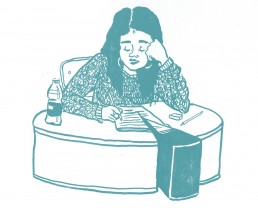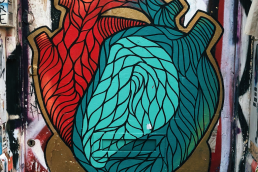Illustrations by Ida Henrich
So, you probably thought Fearless Femme was just a pretty ace website and digital magazine – stunning artwork, beautiful prose, and emotionally resonant thought-pieces peeling back the stigma of mental health to reveal the humanity and beauty of our lived experiences. Right? Well, sure, we’re all that. But we also have to admit that some of us are… nerds.
Yep, a few of us are those kids in the corner of the library with their noses buried in piles of books. We get our kicks out of theoretical frameworks, research methodologies and data. Each time someone fills out one of our surveys, the research team get a communal hit of endorphins. This is because we take mental health seriously, we want to know why so many people are struggling, and what we can do about it. And that’s why in May we launched a Fearless Femme Research Programme as a core part of our activities. So far, we’ve conducted six research surveys, and almost 30 polls on Twitter and Instagram.
As discussed in our previous blogs, our first tranche of surveys and polls have focused on several issues, including Body Image, LGBTQ+ Pride and Mental Health in the Workplace. However, our greatest focus of attention has been on the student experience – both in terms of being at university and college, and moving into the challenging transitional months of leaving higher education. And that’s what we have collated information about here — a wee reflection and summary of the journey so far to make sure we’re all on the same page. You can also find this article in our rare September print magazine which is freely available around Edinburgh University.
Surviving Education
Our survey on ‘Surviving Education’ has revealed some fascinating, and at times deeply concerning, experiences of people who have struggled through education. We received 51 responses from our magazine readers, and we found that 67% ‘regularly’ struggled with their mental health at school, college or university, while a further 29% ‘sometimes’ struggled. Some of the main stress factors that were highlighted included “personal, family or relationship difficulties” (66%) and “social pressures or fitting in” (61%).
Specifically, exam time came to light as a particular stressor, with 94% of respondents in one of our Twitter polls believing that their school/uni/college does not give adequate mental health support during exams and 81% thinking that the exam rhetoric in education has a negative effect on their mental health.
Life after Education
We’ve been hypothesising that an oft-overlooked and at-risk demographic for mental health problems is recent graduates, and judging from the feedback we’ve been getting, this feeling is reflected in the Fearless Femme community. This is particularly problematic when you consider that – in our Surviving Education survey – so many participants had already been facing mental health issues during their time in education. In an Instagram poll, 83% of participants agree that ‘The Graduate Blues’ are an important problem that we should continue to investigate and highlight.
A recent Twitter poll identified some of the stress factors that may cause mental distress for recent graduates. The most pressing was financial pressures (40%), followed by job searching (35%) and loneliness (21%). 4% of respondents selected “other things” and expanded on this to highlight examples such as family issues and not being able to delay making life decisions and growing up.
Mental Health Policy
The reason we are carrying out all this research is in the hope of informing mental health policy. At the beginning of our social media research journey, 40% of Twitter poll participants told us that they don’t feel able to shape mental health policy (27% and 14% felt they were ‘somewhat able’ or ‘unsure’, respectively). This was a bit of a contrast to what we found on Instagram – a simple yes or no poll – which showed that 77% of Instagram followers do not feel able to shape mental health policy and 23% do feel able. Regardless of social media platform disparity, in both cases the majority of respondents felt that they had no say over policy.
With that in mind, we ran a survey exploring opinions on current mental health policies. 86% of respondents felt that the government isn’t doing enough to support the mental health of young people. The remaining 14% selected “not sure”, which left 0% believing the government is doing enough. Some interesting recurring comments which arise in this survey include: “We need mental health policy which is proactive, not reactive” and “[there is] too much box ticking and sloganism without real commitment to understanding”.
We carried out two polls investigating what needs to change – hopefully giving a voice to those followers and readers who don’t feel able to shape policy. It became apparent that more counselling places (33%) and less stigma in society (34%) are what our Twitter followers believe are most necessary for positive change. In our third poll, we discovered that early education on mental health might be the best way to alleviate the aforementioned stigma (59% of voters placed emphasis on early-years mental health education).
Conclusion
It’s clear — both from our research and the weekly news headlines — that there is a mental health crisis among young women and non-binary people, and it’s happening against a backdrop of NHS cuts, Brexit pressures and threats of further healthcare privatisation. In addition to this external context, our findings show that people subjectively don’t feel able to shape policies to make the changes needed to improve our health. We want to change this.
Fearless Femme is an outlet for people who are looking to find a better mental place for themselves. Results from our surveys showed that 88% of our volunteers have struggled with their mental health. And the incredible, awe-inspiring thing about our community is that our writers and artists want to give back and help others. 65% of our contributors donate their work to Fearless Femme to share their story and help others feel less alone, and 92% feel that helping others through Fearless Femme helps their own mental health. Creative writing was the most popular form of self-care (88%) — and we hope you will consider writing as self care too!
But we want to do more than this. At the end of the year, we’ll be publishing our annual research report outlining our findings and policy recommendations to date. We want to give our readers and contributors a voice to shape mental health policy and make real tangible change. If you want to help us with our mission, for instance by filling in some of our surveys or sending us your feedback or views, please get in touch with us. Every voice counts in our Rebelleon against mental-health stigma and we need you to help us make positive change!






